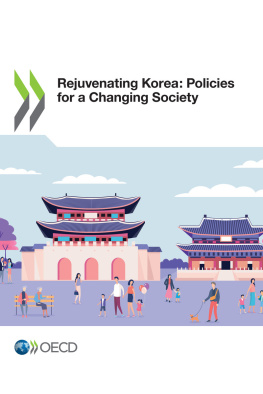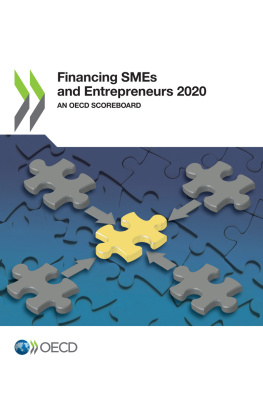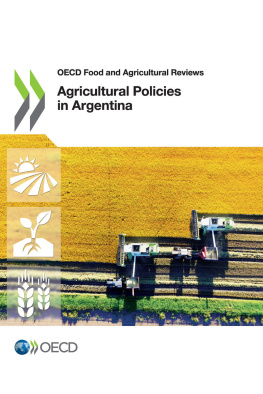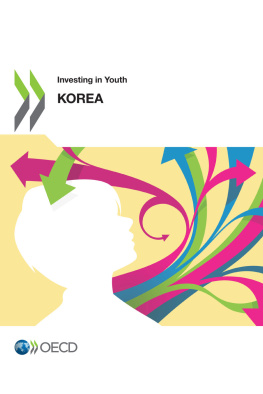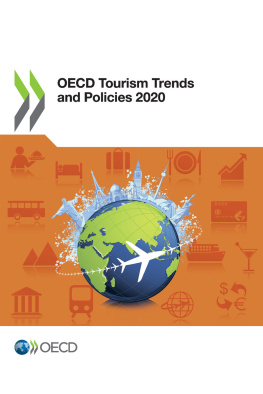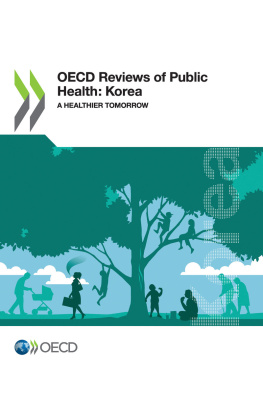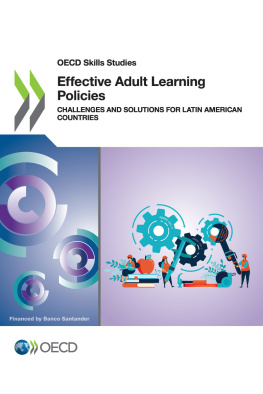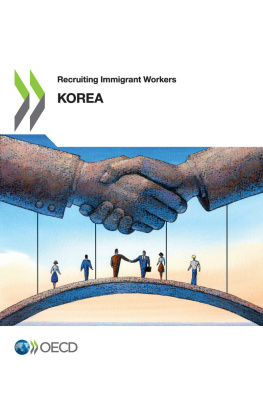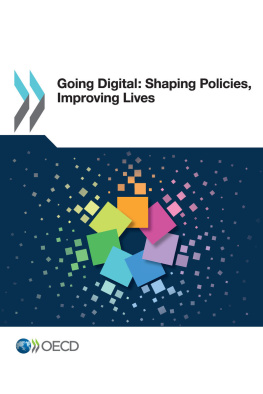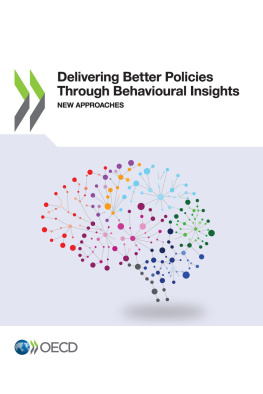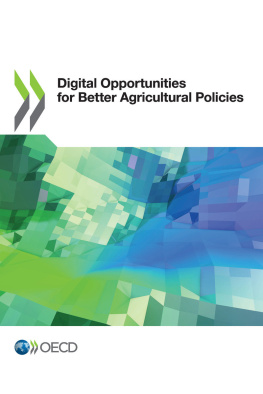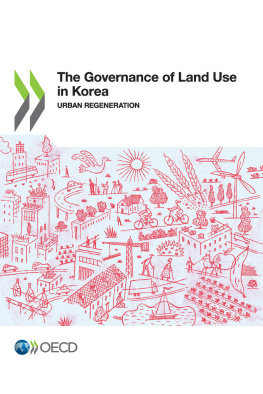OECD - Rejuvenating Korea: Policies for a Changing Society
Here you can read online OECD - Rejuvenating Korea: Policies for a Changing Society full text of the book (entire story) in english for free. Download pdf and epub, get meaning, cover and reviews about this ebook. year: 2019, publisher: OECD Publishing, genre: Home and family. Description of the work, (preface) as well as reviews are available. Best literature library LitArk.com created for fans of good reading and offers a wide selection of genres:
Romance novel
Science fiction
Adventure
Detective
Science
History
Home and family
Prose
Art
Politics
Computer
Non-fiction
Religion
Business
Children
Humor
Choose a favorite category and find really read worthwhile books. Enjoy immersion in the world of imagination, feel the emotions of the characters or learn something new for yourself, make an fascinating discovery.
- Book:Rejuvenating Korea: Policies for a Changing Society
- Author:
- Publisher:OECD Publishing
- Genre:
- Year:2019
- Rating:5 / 5
- Favourites:Add to favourites
- Your mark:
- 100
- 1
- 2
- 3
- 4
- 5
Rejuvenating Korea: Policies for a Changing Society: summary, description and annotation
We offer to read an annotation, description, summary or preface (depends on what the author of the book "Rejuvenating Korea: Policies for a Changing Society" wrote himself). If you haven't found the necessary information about the book — write in the comments, we will try to find it.
OECD: author's other books
Who wrote Rejuvenating Korea: Policies for a Changing Society? Find out the surname, the name of the author of the book and a list of all author's works by series.
Rejuvenating Korea: Policies for a Changing Society — read online for free the complete book (whole text) full work
Below is the text of the book, divided by pages. System saving the place of the last page read, allows you to conveniently read the book "Rejuvenating Korea: Policies for a Changing Society" online for free, without having to search again every time where you left off. Put a bookmark, and you can go to the page where you finished reading at any time.
Font size:
Interval:
Bookmark:
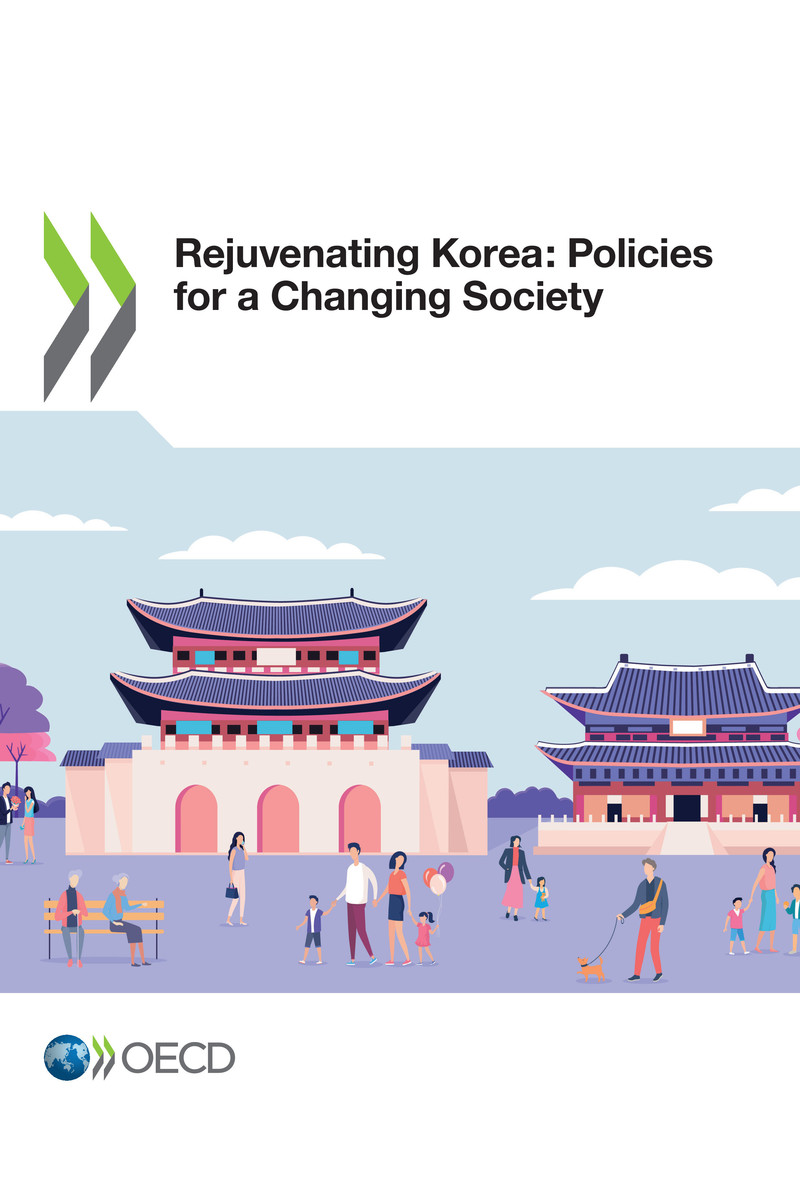
OECD (2019), Rejuvenating Korea: Policies for a Changing Society , OECD Publishing, Paris, https://doi.org/10.1787/c5eed747-en .
Families are changing rapidly in OECD countries. Only a few decades ago, most families in most OECD countries followed the traditional married-couple male-breadwinner model. Many couples married in their twenties and settled down to have children soon after. Birth rates were high by todays standards (if already falling), and separation and divorce were relatively uncommon. Paid work within the family was dominated by the male partner; many women left work on marriage or parenthood, and often did not return to the labour market until after their children had left education, if at all.
Families look very different today. Partnering behaviours have changed substantially, with young people increasingly choosing to postpone marriage and parenthood until they are established in the labour market. Today, on average across the OECD, adults do not marry for the first time until they are into their thirties. More frequent divorces and separations have driven a sharp increase in the diversity of family living arrangements. Many more children are now living in single-parent families, with unmarried cohabiting parents, or in re-constituted families. In the labour market, for most couples in most OECD countries, dual earning has become the norm.
The changing nature of families and family life means that family policy must change, too. The OECD has long emphasised the need for governments to modernise their family policy packages; the Babies and Bosses series, released in the early- to mid-2000s, set the tone for almost two decades of research exploring and highlighting international good practice in modern family policy. The common message throughout this work is that family policy can only succeed if it provides co-ordinated, joined-up assistance to all families in all their forms. This means offering families a continuum of support from birth through until adulthood, helping parents meet their work and family goals and protecting all families from poverty and disadvantage, whatever their circumstances.
This report, Rejuvenating Korea , builds on the OECDs body of data- and policy work on families and children. It takes a close look at families and family policy in Korea, at a time when both are undergoing wholesale change. It reviews the many recent developments in Korean family policy and asks where Korean policy should go next to promote family and child outcomes. It pays particular attention to what Korea can do to boost its low and falling fertility rates.
This report was prepared in the OECD Directorate for Employment, Labour and Social Affairs (ELS), under the supervision of Willem Adema and the senior leadership of Stefano Scarpetta (Director of ELS), Mark Pearson (Deputy Director of ELS) and Monika Queisser (Head of Social Policy).
The report was written by Willem Adema, Chris Clarke, Eunkyung Shin and Olivier Thvenon, with valuable contributions from Shannon Gedo and Jiwan Lee. The report benefited from comments and feedback by Christophe Andr, Randall Jones, Veerle Miranda, the Korean authorities and Delegates to the OECD Employment, Labour and Social Affairs Committee. Natalie Corry prepared the report for publication. Lucy Hulett, Liv Gudmundson, Linda Moran, Fatima Perez and Alastair Wood provided valuable further logistical, publication and communications support.
The OECD gratefully acknowledges financial support provided by the Republic of Korea for the preparation of this report.
Korea is a changing society. Over the past 60 years, strong economic development has made Korea the ninth largest economy in the world. Koreas men and women are among the most highly educated in the world. Gains in opportunities outside of marriage in the labour market and in wider society together with the increasing costs of raising children mean that the traditional marriage package the male breadwinner notion has lost its appeal to many young women, especially those with high levels of educational attainment. Nevertheless, childbirth remains strongly associated with marriage. Thus, the barriers young people face in finding a partner while establishing themselves in the labour market contribute to declining fertility. Indeed, total fertility rates have dropped from six children per woman on average in 1960 to just below one child per woman in 2018. At the same time, greater wealth and better access to health supports have contributed to rapid gains in life expectancy: Korea faces the fastest rate of population ageing across the OECD.
The benefits of economic growth have not been shared evenly in Korea: income inequalities are wider than across the OECD on average and about one in six Koreans live in poverty, among which are many elderly. These income inequalities are related to the limited redistributive power of the Korean tax/benefit system and the profound divide in Koreas labour market between regular workers who benefit from job stability, seniority-based earnings progression and access to social protection coverage and non-regular workers with fixed terms contracts, limited earnings growth and restricted access to social protection.
The prevailing long working hours culture in Korea makes it difficult to reconcile work and family life, contributing to female employment rates below the OECD average. Labour market dualism makes it difficult for women to return to regular employment after a period out of the labour force. Since working women are under-represented in regular jobs, Korea has one of the highest gender pay and employment gaps among OECD countries. Labour market dualism also inspires sharp competition for the number of available regular jobs for labour market entrants. As young people find it difficult to build stable careers, they hesitate to start a family.
Competition for good school and university places that lead to secure and well-paid careers starts early in Korea. Even before primary school age, many parents invest in supplementary private education to position their children as well as possible for entrance into Koreas most prestigious schools and universities. Korean parents and their children engage in an educational struggle to get ahead that involves daily participation in schools, after-school programmes, private tutoring schools or Hakwon, as well as homework children often spend more than 10 hours per day on such activities. The high private education costs are often regarded as a barrier to having (more) children.
Font size:
Interval:
Bookmark:
Similar books «Rejuvenating Korea: Policies for a Changing Society»
Look at similar books to Rejuvenating Korea: Policies for a Changing Society. We have selected literature similar in name and meaning in the hope of providing readers with more options to find new, interesting, not yet read works.
Discussion, reviews of the book Rejuvenating Korea: Policies for a Changing Society and just readers' own opinions. Leave your comments, write what you think about the work, its meaning or the main characters. Specify what exactly you liked and what you didn't like, and why you think so.

